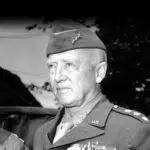George Smith Patton Jr. was born on November 11, 1885, and was a general in the U.S. Army from 1909 to 1945. He participated in World War I and World War II and was beloved by many. He was good at inspiring his troops and getting their attention as he was very well-spoken and eloquent, even when his speeches offended people. He was known for being an effective commander and a strong leader who had a strategy of leading from the front. He succeeded in getting the most out of his troops and impressed all those who worked with him.
Fast Facts
Full Name:
George Smith Patton Jr.
Nickname:
Bandito, Old Blood and Guts
Birth date:
November 11, 1885
Death date:
December 21, 1945 (age 60)
Zodiac Sign:
Scorpio
Height:
6' 1.6"
Net Worth:
$1.5 million
Background
George Smith Patton Jr. was born on November 11, 1885, in San Gabriel, California. His father worked as an attorney and businessman and became the first mayor of San Marino, California. He had one younger sister named Anne. During his childhood, Patton struggled to learn reading and writing but excelled in adulthood. He was tutored at home and enrolled in Stephen Clark’s School for Boys at 11. Patton became an avid reader and was especially interested in reading classical military history. He read about major leaders such as Hannibal, Julius Caesar, Napoleon Bonaparte, and Joan of Arc.
Patton attended Virginia Military Institute which his father and grandfather attended. There, Senator Thomas R. Bard nominated him for West Point. While he performed well in military drills, his academic performance was so poor that he had to repeat his first year. In 1909, Patton graduated at number 46 out of 103 cadets. He became a second lieutenant at the Cavalry branch.
In 1916, Patton entered combat during the Pancho Villa Expedition. He was a part of the United States Tank Corps during World War I. He also commanded the second Armored Division during World War II. He became the first Allied commander to reach Messina when he commanded the U.S. Seventh Army during the Allied invasion of Sicily. Patton served in the Mexican Punitive Expedition, World War I, and World War II. He became a four-star officer in 1945. Patton won many military decorations and medals such as the Distinguished Service Cross, the Army Distinguished Service Medal, and the Silver Star. He continued serving until his death.
Career timeline
Patton is chosen to participate in the Olympic Games.
Patton studies fencing and designs a Cavalry Sword known as the Patton Saber.
Patton first enters combat during the Pancho Villa Expedition.
Patton receives the second highest military decoration for soldiers, with extraordinary heroism.
Patton leads troops in an invasion of Casablanca and impresses many with his leadership skills.
Patton is named military governor of Bavaria.
Why We Love George S. Patton
He was a strong leader
Patton was known for being strong and ruthless. He was driven and excelled at leading combat. He was praised for employing tanks, motorized infantry, and self-propelled artillery.
He was charismatic
Patton excelled at inspiring and encouraging his troops. His speeches were well-loved by troops who admired him. His speeches gave his troops an aggressive desire to reach victory.
He was dedicated to serving his country
Patton spent the majority of his adult life fighting for his country. He was only 24 when he began serving in the army and continued his service until he passed.
5 Surprising Facts
He believed in reincarnation
Patton believed he had experienced combat many times and that he had fought alongside Napoleon; he believed that he would lead armies again after his death.
His son served in the military
Inspired by his father, George Patton IV served in the military from 1942 to 1980.
He was incredibly brave
After being badly wounded during battle, Patton insisted on commanding his troops and later doing his reports before being taken to a hospital.
He carried pistols with ivory handles
Patton carried two pistols for added safety with ivory handles and hand-carved initials; this became his trademark.
His assistant was illiterate
Having struggled in learning to read and write himself, Patton assigned an illiterate but very qualified assistant.
George S. Patton FAQs
Did Patton ever lose a battle?
Patton lost only one battle at Fort Driant in 1944.
What happened to General George Patton?
Patton suffered a blood clot and passed away in his sleep.
Why was Patton relieved of command?
Patton was relieved of command for making aggressive comments toward the Soviet Union.
George S. Patton’s birthday dates
| Year | Date | Day |
|---|---|---|
| 2025 | November 11 | Tuesday |
| 2026 | November 11 | Wednesday |
| 2027 | November 11 | Thursday |
| 2028 | November 11 | Saturday |
| 2029 | November 11 | Sunday |



















